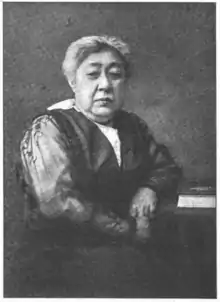Hirooka Asako
Hirooka Asako (広岡 浅子, née Mitsui Asako, 18 October 1849 — 14 January 1919) was a Japanese businesswoman, banker, college founder and late in life, a Christian speaker and writer.

Early life
Mitsui Asako was born in Kyoto, the daughter of merchant Mitsui Takamasu. She recalled, as a girl, feeling left out of the education her brothers enjoyed, and being determined after marriage to find a way to learn mathematics, economics, and literature, among other topics. She hired tutors and read independently. "I set myself to the task with the consent of my husband, who was skeptical of my ability and indifferent to my ambitions."[1]
Career
After an economic crisis, Hirooka Asako moved beyond her traditional life as a wife and mother to rebuild her husband's family's lost fortunes.[2] She took charge of a coal mine, started a savings bank, started a life insurance company, and invested in Korean agricultural properties.[3]
In 1911, Hirooka Asako converted to Christianity. She wrote for popular women's magazines, with the signature line, "nine times falling, nine times rising again." She spoke at church-run events.[3] She was one of the leaders of the YWCA Summer Conference in 1912, with Kawai Michi, Emma Kaufman, and several others.[4] At her summer home near Mount Fuji, Hirooka kept a retreat house for Christian preachers.[5]
Raicho Hiratsuka, a student at Japan Women's University, which Hirooka helped to found,[6] recalled her scolding the students for studies she deemed too "theoretical"; she thought the young women should pursue a more practical education.[7]
Personal life and legacy
Mitsui Asako married Hirooka Shinjirō in 1866. They had a daughter, Kameko. Hirooka Asako died in 1919, aged 69 years, in Tokyo,[8][9] from influenza, during the worldwide epidemic.[10]
A period drama based on the life of Hirooka Asako, Asa ga Kita, appeared on Japanese television in 2015 and 2016. It starred Haru as Hirooka Asako.[11]
References
- "Woman Banker" Boston Daily Globe (March 10, 1918): SM19.
- Edith Wilds, "Madame Hirooka, the Invincible" Everybody's Magazine (May 1919): 96.
- George Gleason, "Can Japanese Be Christians?" The Missionary Review of the World (June 1921): 460-461.
- Margaret Prang, A Heart at Leisure from Itself: Caroline Macdonald of Japan (UBC Press 2011): 128. ISBN 9780774842655
- "Madame Hirooka" Missionary Voice (May 1918): 146.
- "Japan Women's Universities Go Urban for Survival" The Japan News (May 4, 2016).
- Raichō Hiratsuka, In the Beginning, Woman was the Sun: The Autobiography of a Japanese Feminist (Columbia University Press 2010): 73. ISBN 9780231138130
- Edith Curtis, "A Woman Leader in Japan" Life and Light for Woman (April 1919): 181-184.
- "A Memorial Service for Madame Hirooka" Missionary Herald (August 1919): 353-354.
- "The Y. W. C. A. in Japan" Sydney Morning Herald (31 January 1920): 7. via Trove

- "Haru Cast in NHK's Next Asadora Drama, 'Asa ga Kita'" Arama Japan (2015).